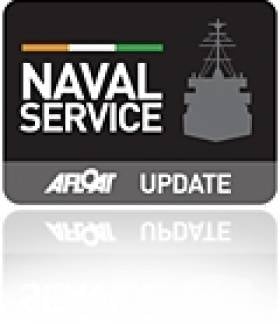Displaying items by tag: LE Samuel Beckett
Naval Service Newbuild OPV L.E. Samuel Beckett Conducts Sea Trials in Bristol Channel
#LESamuelBeckett – The Naval Service newest newbuild OPV L.E. Samuel Beckett (P61) this week has undergone her shipbuilders sea-trails in the Bristol Channel, writes Jehan Ashmore.
The 1,900 tonnes OPV90 class 'enhanced Roisin class' which cost €49m was floated-out in November, carried out sea-trials and among her route included a call offshore of Ifracombe on the North Devon coast and around Lundy Island.
She returned yesterday to her builders, Babcock Marine in Appledore which is approached through the estuary of where the rivers Taw and Torridge meet. The shipyard is sited on the muddy tidal banks of the Torridge, which flows downriver from nearby Bideford.
#SamuelBeckett – At first glance L.E. Samuel Beckett (P61), the first of a pair of longer (90m) newbuild OPV's which was floated-out at Babcock Marine's Appledore shipyard in November, displays a notably larger mast compared to her predecessors, writes Jehan Ashmore.
Images of the €49m L.E. Samuel Beckett reported on the North Devon Gazette, show her leaving the enclosed shipyard on 3 November and berth alongside the tidal quay of the north Devon facility. It is understood that work on her sister, L.E. James Joyce (P62) started the following day.
Since these photos of L.E. Samuel Beckett were taken, the fitting of the mast between the funnel and the wheelhouse has been added (see photo) and this this mainmast is covered in rather than the lattice structure of L.E.Niamh (P52) see photo. She is the last ship built for the navy and is seen berthed at the Naval Service base at Haulbowline, Cork Harbour.
L.E. Samuel Beckett has new state-of-the-art technology features among them robotic submersibles and a historic first for the navy, drones or "unmanned aerial surveillance vehicles".
She is an enhanced version of the 78m long 'leadship' class the L.E. Roisin (P51) and sister L.E. Niamh (P52) which are themselves based on a design from STX Canada Marine (formerly Kvaerner Masa Marine).
The all-steel hull (see L.E. Niamh in rough weather) is based on the Mauritian Vigilant patrol vessel launched in 1995, but without the helicopter deck and hangar facilities. The newbuilds are designed with longer hulls for better sea-keeping qualities so to cope better in rough sea states particularly those in the Atlantic.
As of previous reports, L.E. Samuel Beckett was then expected to be delivered to the Naval Service base in Cork this month or at least within the first quarter of 2014.
In the meantime, her direct predecessor, the former OPV L.E. Emer (P21) which was decommissioned last year following a service of more than 35 years, still remains in Cork Dockyard for new Nigerian owners, Uniglobe Group who plan to use her on the Niger Delta.
Naval Service Newbuild OPV to be Floated-Out in November
#NavalNEWBUILDS – L.E. Samuel Beckett, the first of a pair of newbuild OPV vessels under construction for the Naval Service was expected to be floated-out next month, however this has been re-scheduled to November, writes Jehan Ashmore.
As previously reported last Friday's edition of 'Seascapes' exclusively featured a recorded interview of Commodore Mark Mellett, Flag Officer Commanding of the Naval Service, who spoke of the floating-out of the first new offshore patrol vessel.
According to the Naval Service, it now transpires that the OPV to be named L.E. Samuel Beckett will instead be floated-out in November, though this remains subject to a variety of circumstances among them the state of the tide.
The north Devon shipyard near Bideford is located at Appledore on the muddy banks of the river Torridge which is close to the confluence of the Taw river. Together they form an estuary that flows into the Bristol Channel with up to a 9m tidal range.
L.E. Samuel Beckett is scheduled to be delivered in early 2014 and the second newbuild OPV, L.E. James Joyce is to be delivered a year apart in early 2015. The order for the pair of PV90 class vessels are worth €99m and the work is contracted to Babcock Marine.
The same shipyard, albeit under different ownership had built the PV80 class or 'Roisin' pair which are a design derivitive for the newbuilds currently undergoing construction. Primarily the PV90 class will have an extended hull of 10 metres totalling 90 metres so to improve sea-keeping characteristics particularly in the Atlantic.
Notably the PV90's are to feature drones or "unmanned aerial surveillance vehicles" and robotic submersibles.
It is understood that the afterdeck will have additional space compared to L.E. Roisin (P51) and L.E. Niamh (P52) in that modular units (i.e containers) can be stowed for purposes of overseas missions.
As previously reported, the newbuilds will make a break from tradition in the choice of vessel names are taken from Irish 'male' Nobel-prize winning writers rather than 'female' names based from Celtic mythical figures.































































